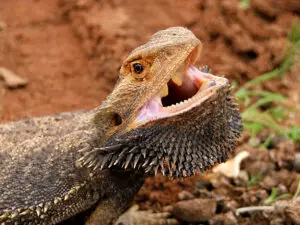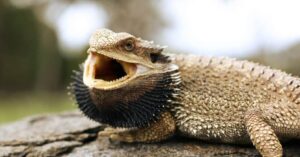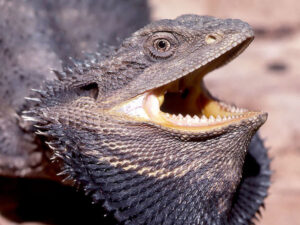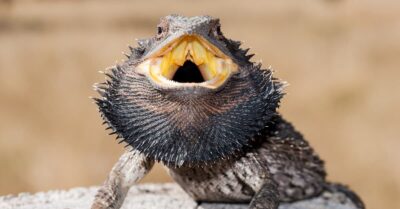You’re considering or already basking in the joy of having a bearded dragon as a pet. They’re undoubtedly fascinating creatures, but one question that often crosses our minds is, “Do bearded dragons have teeth?” I mean, it’s a fair question, right? Let’s dive into the dental side of things and unravel the mystery behind those scaly grins.
Yes, bearded dragons do have teeth. However, their dental structure is a bit different from mammals. Bearded dragons possess pleurodont teeth, which means their teeth are fused to the inner surface of the jawbone rather than being rooted in sockets.
These teeth are designed for gripping and holding rather than chewing, as bearded dragons primarily swallow their food whole. In addition, proper dental care is essential for the well-being of bearded dragons, and providing a balanced diet with appropriate-sized prey items contributes to their dental health.
Do bearded dragons have teeth?

Yes, bearded dragons do have teeth. However, their teeth are not like the sharp, pointed teeth you might associate with carnivorous animals. Bearded dragons are omnivores, meaning they eat a combination of insects and plant matter.
Their teeth are small and somewhat peg-like, designed more for gripping and grinding than tearing. Bearded dragons use their teeth to catch and hold onto prey, as well as to chew and process their food. While their teeth may not be as prominent as those of some other animals, they play a crucial role in the bearded dragon’s feeding process.
Can bearded dragons bite?
Function of teeth in bearded dragons

The teeth of bearded dragons serve several important functions related to their diet and feeding behavior:
- Grasping and Holding Prey: Bearded dragons are opportunistic feeders, and their teeth help them grab and hold onto prey. The teeth are not large or sharp like those of carnivores but are more adapted for gripping and securing insects.
- Chewing and Grinding: Bearded dragons have dental adaptations that aid in chewing and grinding food. While their primary diet consists of insects, they also consume plant matter such as leafy greens and vegetables. The teeth help in breaking down both animal and plant material during the chewing process.
- Processing Tough Food: Some insects and plant materials may be tougher to chew, and the teeth help in processing these tougher items. The grinding action facilitates the breakdown of food into smaller, more digestible pieces.
- Facilitating Omnivorous Diet: Bearded dragons are omnivores, meaning they eat a combination of animal and plant matter. Their teeth are adapted to handle a diverse diet, allowing them to consume a variety of prey and vegetation.
While bearded dragons do have teeth, they may also swallow small prey whole. Additionally, their digestive system plays a crucial role in breaking down and extracting nutrients from the food they consume.
Dental Care in Bearded Dragons
Bearded dragons generally do not require extensive dental care, but maintaining their overall health, including their oral health, is essential. Here are some considerations for dental care in bearded dragons:
- Diet: Providing a balanced and varied diet is crucial for the health of a bearded dragon’s teeth. A proper diet includes a mix of insects (such as crickets, mealworms, or dubia roaches) and a variety of vegetables and greens. This helps ensure they get the necessary nutrients and maintain dental health through natural chewing and grinding.
- Calcium and Vitamin D3: Proper calcium and vitamin D3 supplementation is important for bearded dragons. Calcium is essential for bone health, including teeth. Make sure to dust their food with a calcium supplement regularly, and ensure they receive adequate exposure to UVB light, as it helps with calcium metabolism.
- Monitoring Teeth and Mouth: Keep an eye on your bearded dragon’s teeth and mouth during routine handling. Healthy teeth should be aligned, without signs of discoloration, swelling, or abnormal growth. Any abnormalities or signs of dental issues should be addressed promptly with a veterinarian.
- Provide Opportunities for Natural Chewing: Including items in the enclosure that allow for natural chewing can help maintain dental health. This could include branches, non-toxic plants, or other safe materials that they can chew on.
- Regular Veterinary Check-ups: Regular veterinary check-ups are important for assessing overall health, including dental health. If you notice any changes in eating habits, drooling, or signs of discomfort around the mouth, seek veterinary advice promptly.
- Avoid Hard or Abrasive Substrates: The substrate in the enclosure should not be overly abrasive or hard, as this can lead to wear on the bearded dragon’s teeth. Opt for substrates that are safe and comfortable for them.
If you have concerns about your bearded dragon’s dental health or notice any issues, it’s recommended to consult with a reptile veterinarian. Professional guidance can help address specific concerns and ensure your pet’s overall well-being.
Common Dental Problems

While bearded dragons generally have fewer dental problems compared to mammals, there are still some issues that can arise.
Here are a few common dental problems that may affect bearded dragons:
- Malocclusion: Malocclusion refers to misalignment of the teeth, where the upper and lower teeth do not meet properly. This can result in difficulty eating and lead to abnormal wear on the teeth.
- Overgrown Teeth: Sometimes, a bearded dragon’s teeth may become overgrown, especially if they are not wearing down naturally. Overgrown teeth can interfere with proper jaw function and may require veterinary intervention to trim them.
- Tooth Decay: While not as common as in mammals, tooth decay can occur in bearded dragons, particularly if their diet lacks proper nutrients. A diet too high in sugary fruits or low in calcium can contribute to dental problems.
- Infections and Abscesses: Infections in the mouth, often accompanied by abscesses, can occur. These may be the result of injuries, dental abnormalities, or bacterial infections. Signs of mouth infections may include swelling, redness, and difficulty eating.
- Foreign Object Impaction: Bearded dragons may accidentally ingest foreign objects, which can get stuck in their mouth or between their teeth. This can cause irritation, inflammation, and potential dental issues.
- Metabolic Bone Disease (MBD): While not strictly a dental problem, metabolic bone disease can affect the overall health of a bearded dragon, including its jaw and teeth. MBD is often linked to a lack of proper calcium and vitamin D3 in the diet.
If you observe any signs of dental problems in your bearded dragon, such as changes in eating habits, drooling, swelling around the mouth, or discomfort, it’s crucial to consult with a reptile veterinarian. Regular veterinary check-ups can help catch and address dental issues early, preventing them from becoming more severe.
Additionally, providing a well-balanced diet, proper supplementation, and maintaining good husbandry practices can contribute to overall dental health in bearded dragons.
How often do bearded dragons shed their teeth?
Bearded dragons continuously shed and replace their teeth throughout their lives. This process is known as polyphyodonty. Unlike mammals, which typically have two sets of teeth (deciduous or “baby” teeth and permanent teeth), reptiles like bearded dragons continually grow and shed teeth as needed.
The rate of tooth shedding can vary among individual bearded dragons and is influenced by factors such as diet, age, and overall health. Typically, you may not observe the shedding process as it happens gradually, and the old teeth are often consumed along with food.
Maintaining a proper diet that includes a variety of insects and plant matter, along with appropriate calcium and vitamin D3 supplementation, is crucial for supporting the continuous growth and replacement of teeth. Adequate nutrition contributes to the overall health of bearded dragons, including their dental health.
If you notice any signs of abnormality, discomfort, or changes in eating behavior, it’s advisable to consult with a reptile veterinarian. Regular veterinary check-ups can help ensure that your bearded dragon’s oral health is in good condition, and any potential issues can be addressed promptly.
Conclusion
The answer to the question “Do Bearded Dragons Have Teeth?” is a definite yes. Bearded dragons possess a set of small, peg-like teeth that serve various functions crucial to their overall well-being. These teeth aid in grasping and holding prey, chewing and grinding food, and processing both animal and plant matter, as bearded dragons are omnivores.
While their teeth may not be as prominent as those of other animals, they play a vital role in the dragon’s feeding process. Proper dental care, including a balanced diet, appropriate supplementation, and regular veterinary check-ups, ensures the maintenance of good oral health in these fascinating reptiles.

